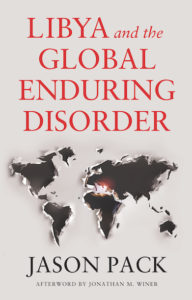Global Disorder After “Liberal” Hegemony w/ Jason Pack
Why are international politics today marked by a sense of gathering global disorder? Is “liberal” hegemony and its decline a source or consequence of this new era of global disorder? Exploring answers to these questions aims to clarify the dangers and opportunities for global order and disorder in the twenty-first century. Join Libya and the Global Enduring Disorder author Jason Pack and others to discuss the sources and future of global disorder after “liberal” hegemony.
About the speaker and chair
Jason Pack is the Founder of Libya-Analysis LLC and Senior Analyst for Emerging Challenges at the NATO Defence College Foundation. His most recent book, Libya and the Global Enduring Disorder, explores what Libya’s dysfunctional economic structures and its ongoing civil war reveal about broader patterns in 21st century geopolitics. Jason is the Founder & Emeritus Director of Eye on Isis and its flagship project the Libya Security Monitor, a not-for-profit English-language repository of non-partisan, cross-checked information on security developments in Libya.
Trine Flockhart is Professor of International Relations in the Department of Political Science and Public Management at the University of Southern Denmark and Co-Director of the Center for War Studies. Trine’s research focuses on international order, processes of change and transformation, the crisis in the liberal international order, resilience and NATO and transatlantic relations.
Daniel Nexon is a Professor in the Department of Government & the School of Foreign Service at Georgetown University. His most recent book, co-edited with Morten Skumsrud Andersen and Alexander Cooley, is Undermining American Hegemony: Goods Substitution in World Politics.
Inderjeet Parmar is Professor of International Politics and City, University of London.
Aaron McKeil is Course Convenor and Course Tutor on the MSc International Strategy and Diplomacy programme at LSE IDEAS. He also produced ‘A Short History of IDEAS’ in 2018 to celebrate LSE IDEAS’ ten-year anniversary. He gained his PhD in International Relations from LSE. He also holds an MSc International Relations Specialist with Distinction from Aberystwyth University and a BA Political Science from the University of British Columbia. He previously served as Editor for Millennium: Journal of International Studies and as a Research Assistant at the LSE Centre for International Studies.
About Libya and the Global Enduring Disorder
We no longer inhabit a world governed by international coordination, a unified NATO bloc, or an American hegemon. Traditionally, the decline of one empire leads to a restoration in the balance of power, via a struggle among rival systems of order. Yet this dynamic is surprisingly absent today; instead, the superpowers have all, at times, sought to promote what Jason Pack terms the ‘Enduring Disorder’.
 He contends that Libya’s ongoing conflict—more so than the civil wars in Yemen, Syria, Venezuela or Ukraine—constitutes the ideal microcosm in which to identify the salient features of this new era of geopolitics. The country’s post-Qadhafi trajectory has been moulded by the stark absence of coherent international diplomacy; while Libya’s incremental implosion has precipitated cross-border contagion, further corroding global institutions and international partnership.
He contends that Libya’s ongoing conflict—more so than the civil wars in Yemen, Syria, Venezuela or Ukraine—constitutes the ideal microcosm in which to identify the salient features of this new era of geopolitics. The country’s post-Qadhafi trajectory has been moulded by the stark absence of coherent international diplomacy; while Libya’s incremental implosion has precipitated cross-border contagion, further corroding global institutions and international partnership.
Pack draws on over two decades of research in and on Libya and Syria to highlight the Kafkaesque aspects of today’s global affairs. He shows how even the threats posed by the Arab Spring, and the Benghazi assassination of US Ambassador J. Christopher Stevens, couldn’t occasion a unified Western response. Rather, they have further undercut global collaboration, demonstrating the self-reinforcing nature of the progressively collapsing world order.
RSVP
